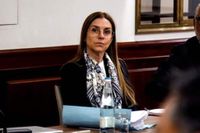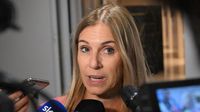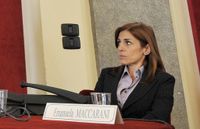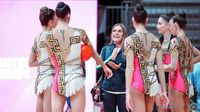On March 26, 2025, the Federal Council of Italy's gymnastics federation (Federginnastica) made a historic decision to terminate the contract of Emanuela Maccarani, who had served as the Technical Director of the national rhythmic gymnastics team for nearly three decades. This decision, announced by newly elected President Andrea Facci, marks a significant turning point in the world of Italian rhythmic gymnastics, which has faced scrutiny and controversy in recent years.
Facci, who took office on March 1, 2025, will assume the role of interim Technical Director until June 30, 2025. He emphasized the need for a new approach within the federation, stating, "We are not worried if great results do not come immediately; what matters is to build and rebuild. The concept of a single person in command is no longer current." This statement reflects a shift towards a more collaborative model of governance in the sport.
The unanimous decision to part ways with Maccarani was not made lightly. Facci acknowledged the challenges faced by the rhythmic gymnastics community over the past two years, particularly in light of allegations of mistreatment against former gymnasts. The decision comes as Maccarani is set to face trial for charges of ill-treatment, following accusations made by former athletes Anna Basta and Nina Corradini. These allegations have cast a long shadow over her tenure, which began in 1996.
During her time as head coach, Maccarani led the Italian team to numerous successes, including multiple international championships. However, the recent allegations prompted a reevaluation of her leadership. Facci expressed gratitude for Maccarani’s contributions, stating, "We thank Emanuela for her successes, but we believe this cycle has come to an end." This sentiment was echoed by the council, which felt that a change was imperative for the future of the sport.
The decision to terminate Maccarani’s contract comes shortly after a court in Monza rejected a request for dismissal of the charges against her, leading to a compulsory indictment. While the sports trial against Maccarani concluded with a mere warning, the national federation has decided to take a more proactive stance in addressing the issues raised by the allegations.
Facci plans to meet with the national gymnasts training at the National Academy in Desio on March 27 at 16:00, ensuring that their training and activities will continue uninterrupted. He aims to communicate the direction the federation will take moving forward, emphasizing the importance of a supportive and safe environment for athletes.
In addition to restructuring the leadership of the rhythmic gymnastics section, the Federginnastica will also initiate a search for a new Federal Prosecutor within the next 30 days. This follows the removal of Michele Rossetti, the previous prosecutor, who was implicated in a scandal involving derogatory remarks about the athletes who accused Maccarani. The federation is committed to ensuring accountability and transparency as it navigates these turbulent times.
The Maccarani case has drawn significant media attention, with many questioning the culture within the sport and the treatment of athletes. The revelations have spurred discussions about the need for reform and support systems for gymnasts, especially those who may feel vulnerable or silenced.
As the federation enters this new chapter, the focus will be on healing and rebuilding trust within the gymnastics community. Facci’s leadership will be crucial in setting a new tone and fostering an environment that prioritizes athlete welfare and development.
In summary, the decision to part ways with Emanuela Maccarani signals a pivotal moment for Italian rhythmic gymnastics. With Andrea Facci at the helm, there is hope for a renewed focus on collaboration, transparency, and the well-being of all gymnasts involved.










